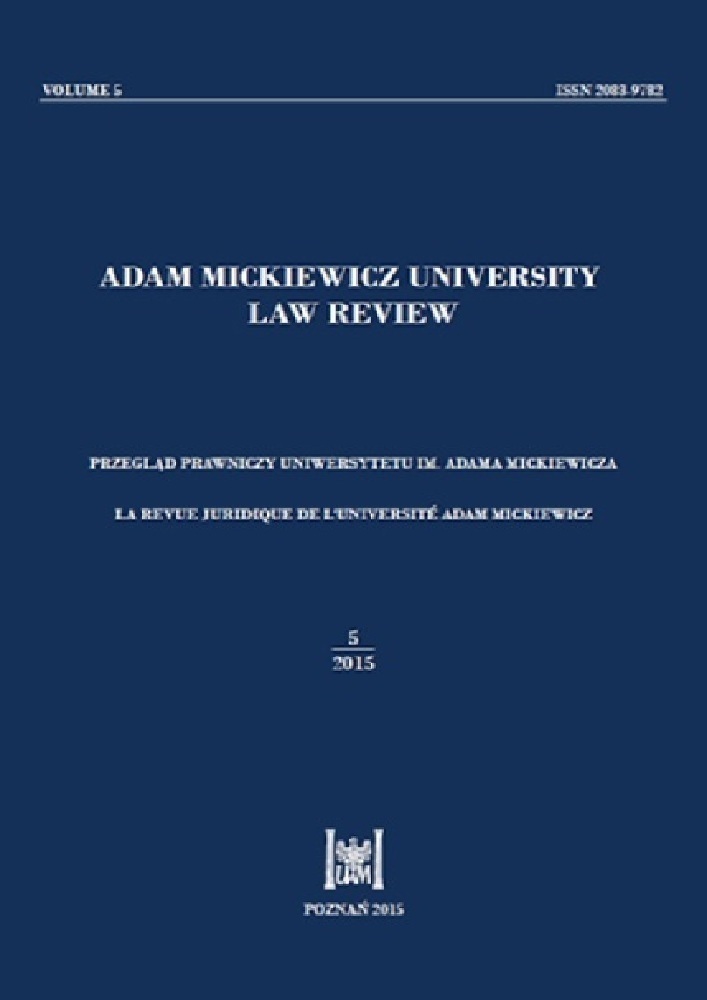Abstract
This article analyses the possibility of utilizing the institution of an extraordinary complaint, which constitutes one of the extraordinary means of appeal in the Polish legal system, as a legal tool available to individuals inbankruptcy proceedings. The article also indicates that an extraordinary complaint, when examined from a systemic perspective within the Polish legal order - particularly in light of the judgment of the European Court of Human Rights in Strasbourg in Wałęsa v. Poland - is a measure that raises certain legal concerns and prompts some political controversies. However, in the author’s opinion, this does not contradict the fact that, regardless of the emerging doubts and controversies (and irrespective of potential future legislative changes regarding this institution), such a measure is extremely important from the perspective of individuals (as subjects of freedoms and rights derived from such conventions as the Constitution of the Republic of Poland and the Convention for the Protection of Human Rights and Fundamental Freedoms, including the right to a fair trial). State authorities should make every possible effort to ensure that this measure is fully effective, efficient, and accessible to individuals at the relevant moment - both in theory and in practice. The article aims to determine whether and to what extent an extraordinary complaint may be applied in bankruptcy proceedings, where the primary objective is to satisfy creditors and organize the debtor’s obligations. At the same time, considering the postulate of ensuring the full effectiveness and efficiency of this means of appeal available to individuals, the author also seeks to examine whether such a measure can be applied in bankruptcy cases that concern the sale of an enterprise under a pre-pack procedure. The article highlights that, despite the formal possibility of filing extraordinary complaints in bankruptcy proceedings, in practice, public authorities do not make use of this measure in relation to rulings issued during bankruptcy proceedings. The article emphasizes how the lack of such action contradicts the constitutional principles of a modern democratic state (including the principle of a democratic state governed by the rule of law that implements the principles of social justice, as indicated in Article 2 of the Constitution of the Republic of Poland, as well as the resulting principle of protecting citizens’ trust in the state and its legal system). An extraordinary complaint should be a fully effective and efficient remedy, also within bankruptcy proceedings. The conclusions indicate that an extraordinary complaint in bankruptcy proceedings should also be admissible in situations where the bankrupt’s assets are sold (including cases of enterprises sold under the pre-pack procedure), particularly when such actions may lead to violations of the constitutional freedoms and rights of individuals (both creditors and the debtor). In the author’s opinion, the possibility of filing such a complaint should be analysed on a case by-case basis, taking into account the legal consequences of decisions made in the course of the liquidation of bankruptcy assets.
References
Bagińska, Lidia. Skarga kasacyjna i nadzwyczajna w postępowaniu cywilnym. Komentarz praktyczny z orzecznictwem, wzory pism procesowych i kazus. Wydawnictwo C.H. Beck, 2018.
Ereciński, Tadeusz, and Karol Weitz. “Skarga nadzwyczajna w sprawach cywilnych.” Przegląd Sądowy, no. 2(2019): 7–19.
Hetnarowicz-Sikora, Joanna. “Europejski Trybunał Praw Człowieka w Strasburgu wobec kryzysu praworządności w Polsce – cz. 2.” Iustitia, no. 1–2(2023): 73–88.
Nowicki, Marek Antoni. “Uchylenie przez Izbę Kontroli Nadzwyczajnej i Spraw Publicznych Sądu Najwyższego (IKNSP) na skutek skargi nadzwyczajnej prokuratora generalnego prawomocnego wyroku w sprawie o zniesławienie wydanego dziesięć lat wcześniej na korzyść skarżącego. Wałęsa przeciwko Polsce [wyrok—23 listopada 2023 r., Izba (Sekcja I), skarga nr 50849/21].” Palestra, no. 1(2024): 103–120.
Zembrzuski, Tadeusz. “Wpływ wprowadzenia skargi nadzwyczajnej na skargę o stwierdzenie niezgodności z prawem prawomocnego orzeczenia.” Przegląd Sądowy, no. 2(2019): 20–38.
Draft Act of December 8, 2017, on the Supreme Court, 8th Sejm Term, Document no. 2003.
Constitution of the Republic of Poland of April 2, 1997 (Journal of Laws of 1997, no. 78, item 483, as amended and corrected).
Resolution of a panel of seven judges of the Supreme Court of October 6, 2000, case no. III CZP 31/00.
Resolution of the Supreme Court of January 27, 2006, case no. III CZP 126/05.
Judgment of Supreme Court of December 17, 2019, case no. I NSNc 5/19.
Judgment of Supreme Court of June 3, 2019, case no. I NSNc 7/19.
Judgment of Supreme Court of November 25, 2020, case no. I NSNc 48/19.
Judgment of Supreme Court of June 24, 2020, case no. I NSNc 41/19
Decision of Supreme Court of June 30, 2021, case no. I NSNc 61/20.
Decision of Supreme Court of May 27, 2021, case no. I NSNk 11/20.
Decision of Supreme Court of February 16, 2022, case no. I NSNc 601/21.
Decision of Supreme Court of October 12, 2007, case no. I CNP 56/07.
Judgment of European Court of Human Rights (First Section) of November 23, 2023, in the case of Wałęsa v. Poland, spplication no. 50849/21.
Judgment of the Grand Chamber of the European Court of Human Rights in the case of D.H. and Others v. the Czech Republic.
License
Copyright (c) 2024 Bartłomiej Panek

This work is licensed under a Creative Commons Attribution 4.0 International License.

